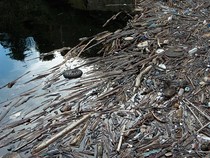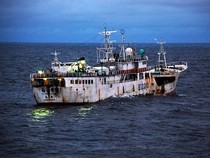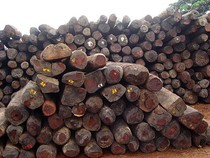Description
Environmental crime is a rising challenge for developed and developing countries. It is often transnational in nature and hence for the purpose of this topic, it is called organised environmental crime. This form of criminal activity involves, amongst others, the trafficking in natural resources including forest products and wildlife, illegal fishing, hazardous waste movement and illegal exploitation of and trafficking in minerals and precious stones.[1]
Organised crimes against the environment have serious social, development and economic consequences, particularly in least developed countries, and are a threat to basic human rights.[2] The transnational nature of environmental crimes, the established involvement of organised criminal groups and the failings of government structures and criminal justice systems often sustain these forms of criminality.[3]
Organised crime – whether targeting environmental interests or other areas – adopts different forms of corruption to infiltrate political, economic and social levels all over the world.[4] It is not restricted by borders and can affect a nation’s economy, security and even its existence.[5] A significant proportion of both wildlife and pollution crime is carried out by organised criminal networks, drawn by the low risk and high profit nature of these types of crime.[6] The involvement of organised criminal groups acting across borders is one of many factors that have favoured the considerable expansion of environmental crimes.[7] Led by vast financial gains and facilitated by a low risk of detection and scarce conviction rates, criminal networks and organised criminal groups are becoming increasingly interested in such illicit transnational activities.[8]
Even though environmental crime may sometimes be perceived by some as a ‘victimless’ crime, it can have far-reaching and severe impacts.[9] Environmental crime can result in the loss of irreplaceable ecosystems, threaten biodiversity and endangered species, cause atmospheric damage, affect primary industries and increase costs associated with environmental rehabilitation.[10] For example, the illicit manufacture of the ecstasy family of illicit drugs (MDMA and MDA) relies on safrole, a chemical substance almost exclusively sourced from the oils of rare tree species in South-East Asian forests.[11] It is the destructive manner in which the safrole rich oil is harvested that compounds the loss of rare tree species and so severely threatens the sensitive ecology of the area.[12]
The problems generated by transnational organised crime transcend national boundaries and require coordinated action at the international level.[13] Strong institutional capacities are therefore crucial in effectively addressing and limiting the successfulness of organised crime syndicates.[14]
[1] “What does environmental crime have in common with organised crime?”, UNODC, accessed January 15, 2014, http://www.unodc.org/unodc/en/frontpage/what-does-environmental-crime-have-in-common-with-organised-crime.html.
[2] Ibid.
[3] Ibid.
[4] “Organised Crime and Corruption”, UNICRI, accessed January 15, 2014, http://www.unicri.it/topics/organised_crime_corruption/ (hereinafter “UNICRI”).
[5] “Environmental crime”, INTERPOL, accessed January 15, 2014, http://www.interpol.int/Crime-areas/Environmental-crime/Environmental-crime.
[6] Ibid.
[7] UNICRI.
[8] Ibid.
[9] “Environmental Crime”, Australian Crime Commission, accessed January 15, 2014, http://www.crimecommission.gov.au/publications/crime-profile-series/environmental-crime.
[10] Ibid.
[11] Ibid.
[12] Ibid.
[13] UNICRI.
[14] Ibid.
International Action
In today’s global economy there is a need for an international strategy to deal with organised environmental crime. INTERPOL, as an intergovernmental organisation facilitating international police cooperation, is a forum where countries can go to to share and process criminal information globally. As such, INTERPOL is uniquely qualified to lead in the efforts to fight organised environmental crime. The INTERPOL Environmental Crime Programme is responsible for the following:[1]
- To lead global and regional operations to dismantle the criminal networks behind environmental crime using intelligence-driven policing
- To coordinate and develop international law enforcement best practice manuals, guides and other resources;
- To provide environmental law enforcement agencies with access to … services by enhancing their links with INTERPOL National Central Bureaus; and
- To work with the Environmental Crime Committee to shape the Programme's strategy and direction.
In 2012, the United Nations Environment Programme (UNEP) and INTERPOL released a Rapid Response Report, entitled “Green Carbon: Black Trade”. Therein, it states that illegal logging now accounts for between 15 and 30 per cent of the global legal trade and significantly hampers the Reducing Emissions from Deforestation and forest Degradation (REDD) initiative - one of the principal tools for stimulating environmental change, sustainable development, job creation and reducing emissions.[2] This joint report also claims that illegal timber trade by organised crime groups by itself is estimated to be worth between USD 30 and 100 billion annually.[3] Additionally, the report also highlights a rise in other crime types linked to illegal logging, including murder, corruption, fraud and theft, with indigenous forest dwellers particularly affected.[4]
Apart from INTERPOL, the transnational nature of environmental crimes, the established involvement of organised criminal groups and the failings of government structures that often sustain these forms of criminality, are also highly relevant to the work of the United Nations Office on Drugs and Crime (UNODC).[5] Field offices of UNODC are developing projects concerning environmental crime in Moscow, Bangkok, Jakarta and Bogota. The UNODC Commission on Crime Prevention and Criminal Justice in 2007 adopted its resolution 16/1 entitled "International cooperation in preventing and combating illicit international trafficking in forest products, including timber, wildlife and other forest biological resources".[6] This resolution strongly encourages Member States to cooperate at bilateral, regional and international levels to prevent, combat and eradicate these forms of trafficking by applying the United Nations Convention against Transnational Organised Crime and the United Nations Convention against Corruption.[7]
In order to increase awareness of the threat of environmental crime, the United Nations Interregional Crime and Justice Research Institute (UNICRI) organised a conference in Rome in December 2011 entitled “Illicit Trafficking in Waste: A Global Emergency”. Participants included the Ministry of the Environment of Italy, parliamentarians, INTERPOL and stakeholders involved in countering trafficking in and dumping of toxic waste.[8]
UNICRI is currently implementing a research and data collection project in the domain of environmental crime, with a specific focus on the dumping of illegal waste and hazardous materials, including e-waste, and its relation with organised crime.[9] The research methodology follows the one that has been successfully applied by UNICRI so far in other fields related to organised crime (such as counterfeiting, for example), and will be utilised to investigate different areas of environmental crime.[10]
In partnership with several research institutes, civil society organisations, and municipalities, UNICRI has launched a process for consultation at the international level on the involvement of organised crime in environmental crime, with a view to identifying a set of recommendations for more effective policies and action at the national, regional and international levels.[11] To that end, UNICRI, in partnership with UNEP, has organised an international conference in Italy on 29 and 30 October 2012.[12]
[1] “Environmental crime”, INTERPOL, accessed January 15, 2014, http://www.interpol.int/Crime-areas/Environmental-crime/Environmental-crime.
[2] “Illegal logging nets organised crime up to 100 billion dollars a year, INTERPOL – UNEP report reveals”, INTERPOL, accessed January 15, 2014, http://www.interpol.int/News-and-media/News-media-releases/2012/PR075 http://www.interpol.int/en/News-and-media/News/2012/PR075/.
[3] Ibid.
[4] Ibid.
[5] “What does environmental crime have in common with organised crime?”, UNODC, accessed January 15, 2014, http://www.unodc.org/unodc/en/frontpage/what-does-environmental-crime-have-in-common-with-organised-crime.html.
[6] Ibid.
[7] Ibid.
[8] “Organised Crime and Corruption”, UNICRI, accessed January 15, 2014, http://www.unicri.it/topics/organised_crime_corruption/ (hereinafter “UNICRI”).
[9] See “A new project to counter illegal trade and disposal of electronic waste: Assessing the volume of e-waste generated in Europe, destination routes and organised crime involvement”, UNICRI, accessed January 15, 2014, http://www.unicri.it/news/article/_Disposal_electronic_waste.
[10] UNICRI.
[11] Ibid.
[12] See “International Conference on Environmental Crime: Current and Emerging Threats”, UNICRI, accessed January 15, 2014, http://www.unicri.it/topics/environmental/conference/.
Featured International Institutions
INTERPOL - Environmental Compliance and Enforcement Committee
United Nations Interregional Crime and Justice Research Institute (UNICRI)
Featured International Initiatives
Global Initiative Against Transnational Organised Crime
International Conference on Environmental Crime (Rome 2012)
Featured International Instruments
Resolution 16/1
Resolution 16/1: International cooperation in preventing and combating illicit international trafficking in forest products, including timber, wildlife and other forest biological resources
GA Resolution 55/25
General Assembly resolution 55/25 of 15 November 2000
ECOSOC Resolution 2001/12
ECOSOC Resolution 2001/12: Illicit trafficking in protected species of wild flora and fauna
ECOSOC Resolution 2003/27
ECOSOC Resolution 2003/27: Illicit trafficking in protected species of wild flora and fauna
ECOSOC Resolution 2008/25
ECOSOC Resolution 2008/25: International cooperation in preventing and combating illicit international trafficking in forest products, including timber, wildlife and other forest biological resources
ECOSOC Resolution 2011/36
ECOSOC Resolution 2011/36: Crime prevention and criminal justice responses against illicit trafficking in endangered species of wild fauna and flora
UNTOC
Convention against Transnational Organised Crime
EU Action
Organised environmental crime is a new dimension within the European Union’s framework against organised crime. According to EU authorities, crimes committed in the environmental field undermines the effective implementation of the legislation adopted by the Community to protect the environment and human health.[1] This response to organised crime adopts an integrated approach that extends from prevention to law enforcement, based on mutual and effective cooperation between the authorities of the Member States. These authorities primarily include local law enforcement agencies in the exchange of information and mutual assistance in seizures and confiscations.
Directive 2008/99/EC of the European Parliament and of the Council of 19 November 2008 on the protection of the environment through criminal law defines a minimum number of serious environmental-related offences. The Directive requires Member States to provide for more dissuasive criminal penalties for this type of offence when committed intentionally or as a result of gross negligence.[2] Member States are then obliged to impose criminal penalties on certain behaviour, by the individual or any legal person, which is considered seriously detrimental to the environment. They should also make sure that inciting, aiding and abetting the committing of a criminal act is punishable.[3]
The following behaviour are classified as a criminal offence:[4]
- unlawful discharge into air, soil or water, of materials or ionising radiation which causes or is likely to cause death or serious injury to any person or substantial damage to the environment;
- unlawful collection, transport, recovery or disposal of waste which causes or is likely to cause death or serious injury to any person or substantial damage to the environment;
- unlawful shipment of waste in a non-negligible quantity;
- unlawful operation of a plant in which a dangerous activity is carried out or in which dangerous substances or preparations are stored or used, and which causes or is likely to cause death or serious injury to any person or substantial damage to the environment;
- the unlawful manufacture, treatment, storage, use, transport, import or export or disposal of nuclear materials or other hazardous radioactive substances which causes or is likely to cause death or serious injury to any person or substantial damage to the environment;
- the unlawful killing, destruction, possession or taking of, or trade in, protected animal and plant species;
- unlawful damage to protected habitats; and
- unlawful trade in or use of ozone-depleting substances.
Directive 2005/35/EC of the European Parliament and of the Council of 7 September 2005 on ship-source pollution and on the introduction of penalties, particularly criminal penalties, for infringements (Ship Source Pollution Directive) is also one of EU’s major legal instrument in combating organised environmental crime. Like Directive 2008/99/EC, the Ship Source Pollution Directive also imposes criminal liabilities on individuals and legal persons. However, the Ship Source Pollution Directive states that ship-source polluting discharges constitute “in principle a criminal offence” and according to the Directive this relates to discharges of oil and other noxious substances from vessels.[5] Minor discharges shall not automatically be considered as offences unless the act amounts to repetition, in which case leads to a deterioration in the quality of water.[6] One can be criminally liable if found to have acted with intent, recklessly or with serious negligence.[7]
Polluting discharges are forbidden in:[8]
- the internal waters, including ports, of a European Union (EU) country;
- the territorial waters of an EU country;
- straits used for international navigation subject to the regime of transit passage, as laid down in the 1982 United Nations Convention on the Law of the Sea;
- the exclusive economic zone (EEZ) of an EU country; and
- the high seas.
Back in 2003, the European Commission engaged a private company[9] in the study of organised environmental crime in the 15 EU Member States.[10] The sectors requested by the Commission were:
- illegal commercial trade in endangered species and their products;
- illegal pollution, dumping and storage of waste, including transfrontier shipment of hazardous waste;
- illegal commercial trade in ozone depleting substances;
- illegal dumping and shipment or radioactive waste and potentially radioactive material;
- illegal logging and illegal trade in wood; and
- illegal fishing.
Out of the 122 cases researched in the study, the report found that no full prove can be found concerning the required qualification as organised crime. Those cases merely represent the group of “borderline cases” which, despite not fulfilling all of the organised crime criteria, were submitted by the national enforcement authorities as qualifying in the context of the study.
There are indications to suggest that environmental crime activities are attracting the greater interest of organised crime groups. Organised criminal syndicates are moving poached or illegally harvested wildlife with the help of the same sophisticated techniques and networks used for illicit trafficking in persons, weapons, drugs and other contraband.[11] Groups specialising in money laundering, financial crime, thefts and drug trafficking in EU Member States are now engaged in environmental crime as well.[12] In general, however, substantial intelligence gaps preclude a comprehensive assessment of organised crime activity in this area.[13]
[1] “Questions and Answers on the protection of the environment through criminal law”, Europa, MEMO/07/05.
[2] “Protection of the environment through criminal law”, Europa, accessed January 16, 2014, http://europa.eu/legislation_summaries/justice_freedom_security/fight_against_organised_crime/ev0012_en.htm#termescl%C3%A9s.
[3] Ibid.
[4] Ibid.
[5] “Ship-source pollution and criminal penalties”, Europa, accessed January 16, 2014, http://europa.eu/legislation_summaries/justice_freedom_security/fight_against_organised_crime/l24123_en.htm#key.
[6] Ibid.
[7] Ibid.
[8] Ibid.
[9] Betreuungsgesellschaft für Umweltfragen (BfU).
[10] See Betreuungsgesellschaft für Umweltfragen, Organised environmental crime in the EU Member States (Report for the European Commission 15 May 2003) (hereinafter BfU Report).
[11] John Scanlon, Ivory and Insecurity: The Global Implications of Poaching in Africa (Written testimony at the United States of America Senate Foreign Relations Committee Hearing), accessed January 16, 2014, http://www.cites.org/eng/news/sg/2012/20120525_SG_US-Senate_testimony.php.
[12] BfU Report.
[13] “EU Organised Crime Threat Assessment” (2011), EUROPOL, accessed January 16, 2014, https://www.europol.europa.eu/sites/default/files/publications/octa_2011.pdf.
Featured EU Initiative
EFFACE
European Union Action to Fight Environmental Crime
Featured EU Instruments
EU Directive 2008/99/EC
Directive 2008/99/EC of the European Parliament and of the Council of 19 November 2008 on the protection of the environment through criminal law
EU Council Framework Decision 2008/841/JHA
Council Framework Decision 2008/841/JHA of 24 October 2008 on the fight against organised crime
EU Environmental Liability Directive
EU Directive 2004/35/EC of the European Parliament and of the Council of 21 April 2004 on environmental liability with regard to the prevention and remedying of environmental damage


EFFACE is funded under the 7th Research Framework Programme of the European Union.
The contents of the EFFACE Environmental Crime Research and Action Guide website are the sole responsibility of EFFACE and can in no way be taken to reflect the views of the European Union.





